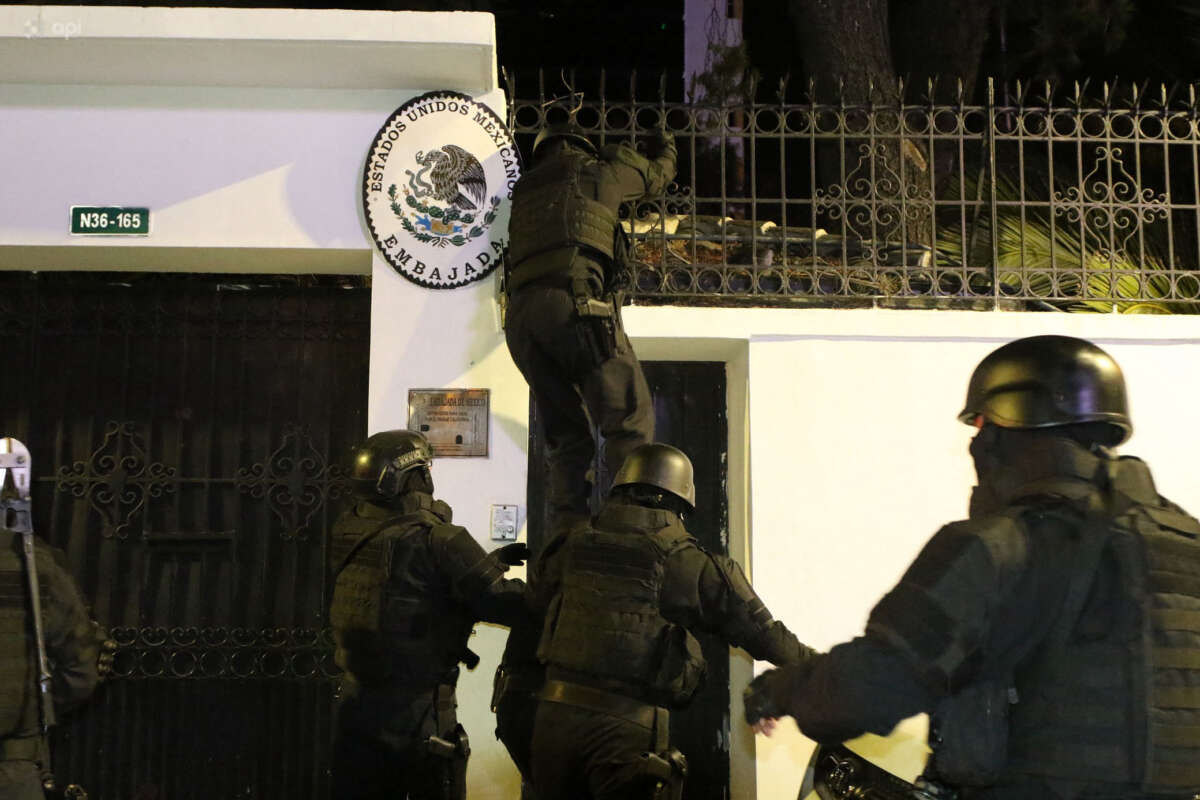Honest, paywall-free news is rare. Please support our boldly independent journalism with a donation of any size.
Mexico on Friday night announced the suspension of diplomatic relations with Ecuador after police stormed the Mexican Embassy in Quito and kidnapped former Ecuadorian Vice President Jorge Glas, who was granted asylum after being convicted of what he claims are politically motivated corruption charges.
“Alicia Bárcena, our secretary of foreign affairs, has just informed me that police from Ecuador forcibly entered our embassy and detained the former vice president of that country who was a refugee and processing asylum due to the persecution and harassment he faces,” Mexican President Andrés Manuel López Obrador said on social media following the raid.
“This is a flagrant violation of international law and the sovereignty of Mexico, which is why I have instructed our chancellor to issue a statement regarding this authoritarian act, proceed legally, and immediately declare the suspension of diplomatic relations with the government of Ecuador,” he added.
Bárcena said that “given the flagrant violation of the Vienna Convention on Diplomatic Relations and the injuries suffered by Mexican diplomatic personnel in Ecuador, Mexico announces the immediate breaking of diplomatic relations with Ecuador.”
Mexican officials said multiple embassy staff members were injured during the raid. They also said that all Mexican diplomatic staff will immediately leave Ecuador, and that Mexico would appeal to the International Court of Justice to hold Ecuador accountable.
Roberto Canseco, head of chancellery and policy affairs at the embassy, told reporters that “what you have just seen is an outrage against international law and the inviolability of the Mexican Embassy in Ecuador.”
“It is barbarism,” he added. “It is impossible for them to violate the diplomatic premises as they have done.”
Ecuador’s government said that Glas — who served as vice president under former leftist President Rafael Correa from 2013-17 — was a fugitive who has been “sentenced to imprisonment by the Ecuadorian justice system” and had been granted asylum “contrary to the conventional legal framework.”
However, Ecuadorian attorney and political commentator Adrián Pérez Salazar told Al Jazeera that “the fact that there was this grievance does not — at least under international law — justify the forceful breach of an embassy.”
“International law is very clear that embassies are not to be touched, and regardless of whatever justifications the Ecuadorian government might have, it is a case where the end does not justify the means,” Salazar added.
Numerous Latin American nations including Argentina, Brazil, Chile, Colombia, Cuba, Honduras, Panama, Uruguay, and Venezuela condemned the Ecuadorian raid.
“The action constitutes a clear violation of the American Convention on Diplomatic Asylum and the Vienna Convention on Diplomatic Relations, which, in Article 22, provides that the locations of a diplomatic mission are inviolable and can be accessed by agents of the receiving state only with the consent of the head of mission,” the Brazilian Foreign Ministry said in a statement. “The measure carried out by the Ecuadorian government constitutes a serious precedent, and must be subject to strong repudiation, whatever the justification for its implementation.”
Honduran President Xiomara Castro de Zelaya — who called the raid “an intolerable act for the international community” — said Saturday that she would convene a special emergency session of the Community of Latin American and Caribbean States on Monday. Castro currently serves as CELAC’s president pro tempore.
The Organization of American States General Secretariat issued a statement Saturday rejecting “any action that violates or puts at risk the inviolability of the premises of diplomatic missions and reiterates the obligation that all states have not to invoke norms of domestic law to justify non-compliance with their international obligations.”
“In this context, it expresses solidarity with those who were victims of the inappropriate actions that affected the Mexican Embassy in Ecuador,” the body added.
It’s been a bad week for the inviolability of sovereign diplomatic spaces. Iran and Syria on Monday accused Israel of bombing the Iranian Consulate in Damascus, an attack that killed 16 people including senior Islamic Revolutionary Guard Corps commanders as well as Iranian and Syrian diplomats and other civilians.
Trump is silencing political dissent. We appeal for your support.
Progressive nonprofits are the latest target caught in Trump’s crosshairs. With the aim of eliminating political opposition, Trump and his sycophants are working to curb government funding, constrain private foundations, and even cut tax-exempt status from organizations he dislikes.
We’re concerned, because Truthout is not immune to such bad-faith attacks.
We can only resist Trump’s attacks by cultivating a strong base of support. The right-wing mediasphere is funded comfortably by billionaire owners and venture capitalist philanthropists. At Truthout, we have you.
Truthout has launched a fundraiser to raise $41,000 in the next 7 days. Please take a meaningful action in the fight against authoritarianism: make a one-time or monthly donation to Truthout. If you have the means, please dig deep.
